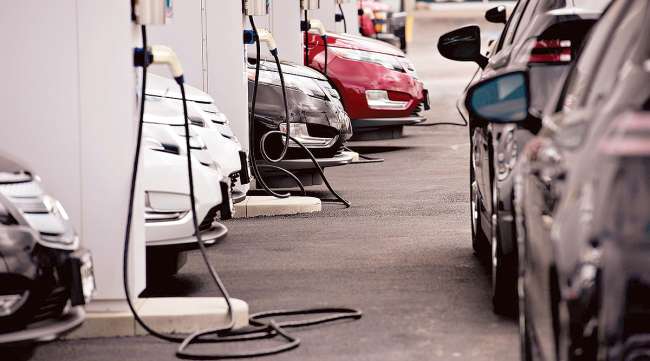Growth of Electric Vehicles Could Jeopardize Iowa’s Road Fund

In about 20 years, the growing use of electric vehicles could take a quarter-billion-dollar-a-year hit on a state fund relied upon to finance better roads, the Iowa Department of Transportation said Jan. 29.
Iowa’s motor fuel tax revenue is falling as average fuel efficiency is increasing and as more Iowans choose electric vehicles, Iowa DOT Director of Planning, Programming and Modal Division Stuart Anderson told members of the state House Transportation Committee. For the current fiscal year, fuel taxes are expected to generate $656 million.
Legislation approved last year directed the Iowa DOT to assess the impact of electric vehicles on the Road Use Tax Fund, a pool of money that comes primarily from taxes drivers pay at the gas pump and also from vehicle registrations.
CAPITOL AGENDA: Little action between president, Hill leaders on infrastructure
Money from the fund is used to help pay for improvements to Iowa’s primary, secondary and farm-to-market roads, and to make grants to municipalities for local road improvements.
There are about 800 battery-electric vehicles in Iowa now, Anderson said, and about 1,900 plug-in hybrid electric vehicles.
Growth of electric cars could jeopardize Iowa’s road fund https://t.co/dlAs3jfBYY — The Gazette (@gazettedotcom) January 30, 2019
While those numbers are relatively low now, he expects them to grow as the availability of all-electric and hybrid models and more charging stations increase.
Today, the impact on the transportation fund is only about $300,000, Anderson said. Next year, the Iowa DOT estimates, it will increase to a range of $488,000 to $564,000 based on national “low loss” and “high loss” scenarios. Then the losses to the fund are expected to increase to somewhere between $349 and $241 million in 2040.
Anderson and Iowa DOT Director Mark Lowe cautioned that forecasts for electric vehicle use vary widely.
The Energy Efficiency Administration projects that by 2050, electric vehicles will account for 14% of new vehicle sales. On the other hand, both Bloomberg New Energy Finance and Energy Innovation estimate about 60% of new vehicle sales will be electric models by that time.
To mitigate the predicted revenue loss from the transportation fund, Iowa DOT is recommending the state add a 2.6-cent per kilowatt-hour excise tax for nonresidential charging stations. That tax would capture revenue from vehicles passing through Iowa that stop to recharge, Anderson said.
In addition, to capture revenue from Iowa electric vehicle owners, the Iowa DOT is proposing a $130-per-year fee be added to battery-electric vehicle registrations; $65 a year for plug-in hybrid vehicle registrations and $9 a year for electric motorcycle registrations.
Distributed by Tribune Content Agency, LLC



